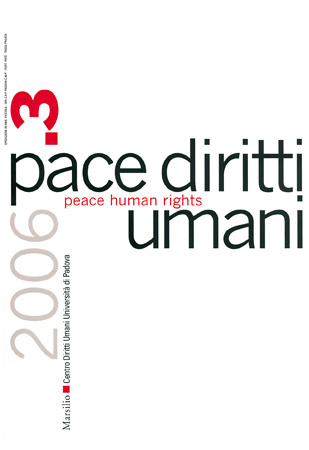Collections

L’esecuzione delle sentenze della Corte di Strasburgo dei diritti umani: panorama europeo e sviluppi recenti nella giurisprudenza italiana
- Contained in
- Pace diritti umani - Peace Human Rights, 3/2006
- Pubblication type
- Articolo / Saggio
- Pages
- 51-92
- Language
- IT
The Execution of Strasbourg Court Judgments: A European Survey and the Latest Italian Case-law
Paolo De Stefani
Beginning from the Broniowski v. Poland case ([GC], 2004), the European Court of Human Rights has developed a case-law aimed at reinforcing the provision of Article 46 of the 1950 Convention.
According to Article 46, State Parties undertake to abide by the final judgments of the Court, that is, when a violation were found, to grant full compensation (restitutio in integrum) to the individual. Besides the most obvious obstacles raised by States and grounded on political unwillingness or domestic structural deficiencies, a major impediment to the actual execution of Strasbourg’s judgments can be the attitude of the judiciary, an independent branch of the State not subject to the executive. In particular, a final decision of a national judge is not likely to be reformed by the declaratory judgment of the Strasbourg’s Court.
This may result into a deeply unsatisfactory situation for the individual, whose prejudice is not fully vindicated through the equitable measure referred to in Article 41. A large number of European States have introduced legislation allowing for the national courts to re-open a case (especially in criminal matters) after the Court of Human Rights found a procedural (Article 6) and/or substantial infringement of the Convention. The Council of Europe, since its Recommendation (2000)2, has strongly supported such a trend. Some States have reached an equivalent result through the case-law of their supreme or constitutional courts. Italy stands among the few States still lacking a proper legislation on the re-opening or re-viewing of a case amounting to res iudicata found in breach of the Convention. The essay examines briefly the Council of Europe States’ positions vis-à-vis this issue, the failed efforts of the Italian Parliament to adopt a legislation, and the possible new avenues disclosed by the 3 October 2006 judgment of the Cassation Court (Somogyi case) and, possibly, by a forthcoming pronouncement of the Italian Constitutional Court Dorigo case). The author pledges for a more active role of domestic judges in implementing the Strasbourg’s judgments whenever possible, according to lex lata, and the reform of the relevant norms of the code of criminal procedure, as a part of a comprehensive European Convention implementation act.

